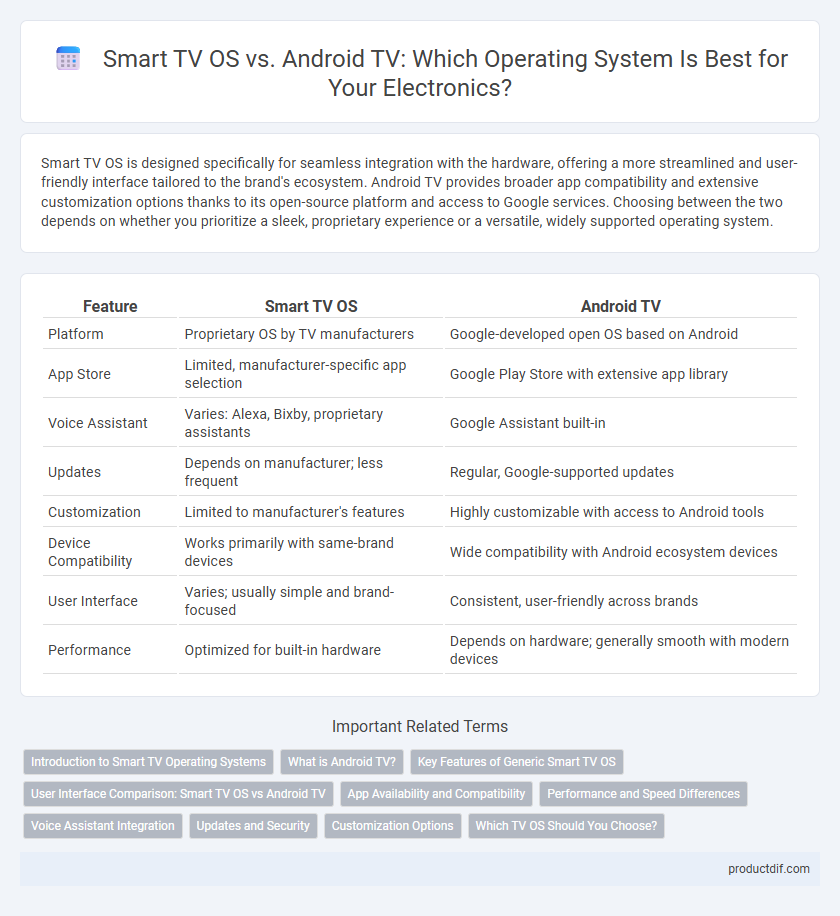Smart TV OS is designed specifically for seamless integration with the hardware, offering a more streamlined and user-friendly interface tailored to the brand's ecosystem. Android TV provides broader app compatibility and extensive customization options thanks to its open-source platform and access to Google services. Choosing between the two depends on whether you prioritize a sleek, proprietary experience or a versatile, widely supported operating system.
Table of Comparison
| Feature | Smart TV OS | Android TV |
|---|---|---|
| Platform | Proprietary OS by TV manufacturers | Google-developed open OS based on Android |
| App Store | Limited, manufacturer-specific app selection | Google Play Store with extensive app library |
| Voice Assistant | Varies: Alexa, Bixby, proprietary assistants | Google Assistant built-in |
| Updates | Depends on manufacturer; less frequent | Regular, Google-supported updates |
| Customization | Limited to manufacturer's features | Highly customizable with access to Android tools |
| Device Compatibility | Works primarily with same-brand devices | Wide compatibility with Android ecosystem devices |
| User Interface | Varies; usually simple and brand-focused | Consistent, user-friendly across brands |
| Performance | Optimized for built-in hardware | Depends on hardware; generally smooth with modern devices |
Introduction to Smart TV Operating Systems
Smart TV operating systems like Tizen, webOS, and Roku OS offer tailored interfaces designed for seamless multimedia streaming and enhanced user experience. Android TV leverages Google's extensive app ecosystem and voice assistant integration, providing broader app compatibility and smart home connectivity. Choosing between proprietary Smart TV OS and Android TV depends on preferences for app availability, interface customization, and ecosystem integration.
What is Android TV?
Android TV is a smart TV operating system developed by Google, offering access to a wide range of apps through the Google Play Store, including popular streaming services, games, and utilities. It supports Google Assistant for voice commands and integrates seamlessly with other Google services, enhancing user interaction and content discovery. Android TV provides regular updates to improve performance, security, and app compatibility, making it a flexible and widely adopted platform for smart televisions.
Key Features of Generic Smart TV OS
Generic Smart TV OS platforms offer a user-friendly interface tailored for seamless navigation and compatibility with multiple streaming services, enabling smooth playback of 4K UHD content. These operating systems prioritize fast boot times, efficient app management, and integrated voice control for hands-free operation. Key features include customizable home screens, support for popular media formats, and built-in AI algorithms that optimize picture and sound quality for an enhanced viewing experience.
User Interface Comparison: Smart TV OS vs Android TV
Smart TV OS interfaces typically offer streamlined navigation tailored to specific brands, ensuring smooth performance with quick access to native apps and features. Android TV provides a more customizable UI with access to Google Play Store, enabling a broader app selection and integration with Google services. The user experience on Smart TV OS often emphasizes simplicity, while Android TV focuses on flexibility and extensive third-party app support.
App Availability and Compatibility
Smart TV OS often offers a curated app store tailored to specific brands, ensuring apps are optimized for performance and seamless integration with hardware, but may have a limited selection compared to Android TV. Android TV benefits from Google's extensive app ecosystem on the Google Play Store, providing users with a broader range of apps and games compatible across various devices. Compatibility on Android TV extends to major streaming platforms, gaming services, and smart home integrations, making it a versatile choice for users seeking diverse app availability and cross-device functionality.
Performance and Speed Differences
Smart TV OS often provides a more streamlined user experience with faster boot times and smoother navigation due to its optimization for specific hardware. Android TV offers broader app compatibility but may exhibit slower performance and occasional lag on lower-end devices due to its more resource-intensive interface. Performance benchmarks typically show Smart TV OS outperforming Android TV in speed and responsiveness on identical hardware configurations.
Voice Assistant Integration
Smart TV OS platforms typically feature proprietary voice assistants optimized for seamless command execution and device control, enhancing user interaction within their ecosystems. Android TV leverages Google Assistant integration, providing extensive voice search capabilities, smart home controls, and access to Google services. This difference influences user experience by determining compatibility with third-party voice-enabled devices and customization options.
Updates and Security
Smart TV OS typically offers manufacturer-specific updates optimized for hardware compatibility, ensuring consistent performance but with slower update cycles compared to Android TV. Android TV benefits from Google's frequent security patches and broad app ecosystem support, providing enhanced protection against vulnerabilities and timely feature improvements. Evaluating update frequency and security protocols is crucial when choosing between Smart TV OS and Android TV for a secure and up-to-date viewing experience.
Customization Options
Smart TV OS typically offers limited customization options tailored to specific brands, ensuring a streamlined user experience but restricting app variety and interface flexibility. Android TV provides extensive customization through access to the Google Play Store, a wide range of third-party apps, and customizable home screens that enhance personalized content delivery. Developers benefit from Android TV's open ecosystem, allowing greater adaptability compared to the closed nature of proprietary Smart TV operating systems.
Which TV OS Should You Choose?
Smart TV OS offers a seamless, manufacturer-specific interface optimized for performance and user experience, while Android TV provides wider app compatibility and customization through the Google Play Store. Choosing Android TV is ideal for users seeking a flexible platform with extensive streaming options and regular updates from Google. Opt for Smart TV OS when prioritizing smooth integration with brand-specific features and simpler, streamlined navigation.
Smart TV OS vs Android TV Infographic

 productdif.com
productdif.com